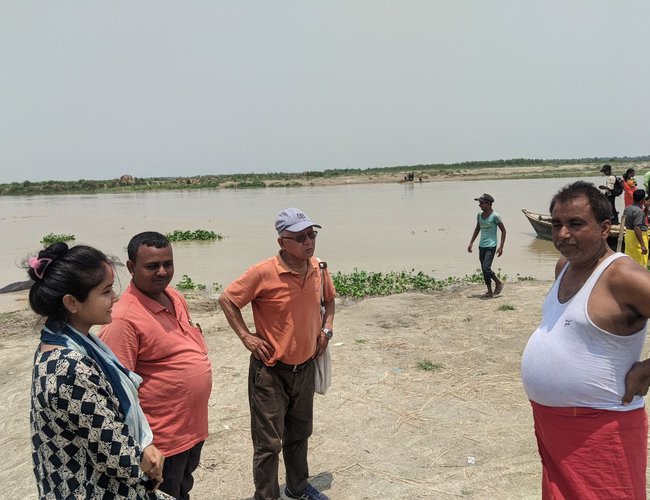
As people residing along the banks of Bagmati and Lalbakiya Rivers have encountered severe challenges from climate change, affecting both the environment and agriculture, the River Bed Farming Project provided much-needed relief to approximately 1,000 households living in five villages of Rautahat District.
Among those benefiting are Umesh Yadav, a 38-year-old man from Bhagbatimai Rural Municipality Ward 3, Rautahat District, Madhesh Province, who has been practicing riverbed farming along the Bagmati River for the past five years. This practice has been a source of income for his family.
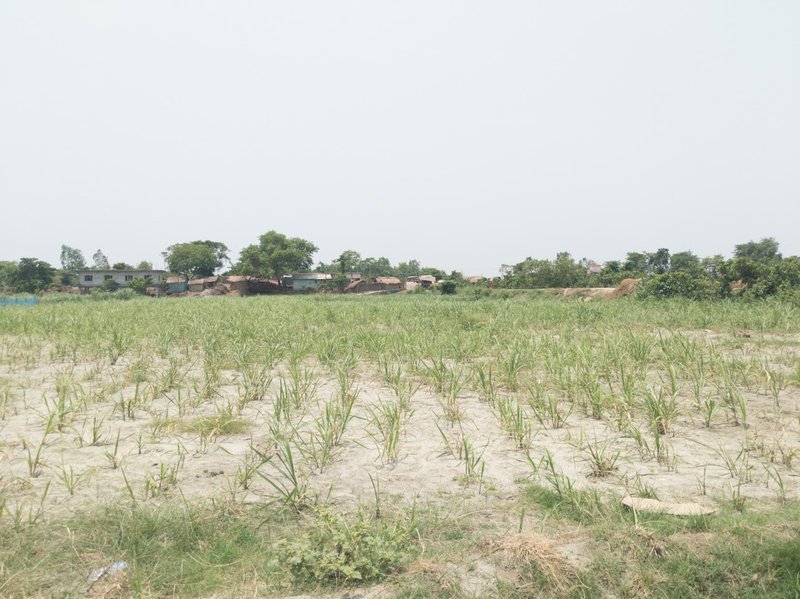
Lemon Grass and Sugarcane
Despite Yadav inheriting 6 Bighas (7.2 acres) of his ancestral land from his father, he now only owns 2 Bighas of land. Of the four Bighas, one-third has been submerged by the river, and another third has been covered in sand.
This situation is not unique to Yadav; many families facing the threat of floods and land loss due to climate change have found hope and assistance through the River Bed Farming Project, which has significantly improved the lives of around 1,000 households in Rautahat District.
“Initially, the villages along the river bank were fertile lands ideal for growing cereal crops and vegetables. However, floods from the Bagmati River have transformed these areas into sandy riverbeds," stated Santosh Jha, a villager and farmer in ward 1 of Durga Bhagbatimai Rural Municipality. Jha, who cultivates vegetables and watermelon on over 6 Bighas (9.8 acre) of land, earns approximately Rs.800,000.00 (US6000) annually.
Due to climate change, extreme weather events have significantly impacted agricultural productivity in regions like the Terai, including Rautahat district. The intense rainfall that leads to sudden flash floods has caused a substantial loss of arable land, which has in turn increased the area of damaged soil, making the land less productive.
It is crucial for the agricultural sector in Nepal to adapt to climate change, given that over 66.5% of the population depends on it for their livelihoods.
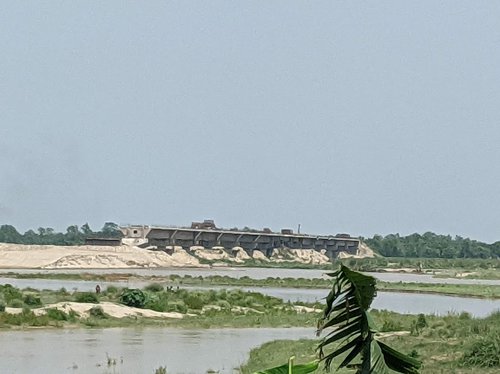
"Floods have turned thousands of hectares of cultivated fields into river banks through siltation and sand deposition, posing a significant threat to food security and heightening the vulnerability of rural communities," said Ram Rup Patel, the chairman of Ward 3 of Raj Devi Municipality in Rautahat District.
"The Bagmati river transformed my 10 Bighas of land into its river bed. For years, we merely observed the destruction caused by floods, turning once-fertile soil into a layer of sand and rendering it unproductive.
Although riverbed farming, both formally and informally, was practiced in Kailali and Kanchanpur as early as 2007 and was essentially employed for decades previously, the inhabitants of the Rautahat's inner areas lacked both the knowledge and skills necessary for such methods.
“During the 2018 support of the Riverbed Farming Project by Helvetas Nepal, which sought to enhance the livelihoods of food security and nutrition, and to diminish vulnerability while increasing the ability to adapt to the effects of climate change and its variability for sustainable living, the deserted land remained unused for commercial purposes,” said Ramshrestha Yadav, Chairperson of Friends of Change in Nepal.
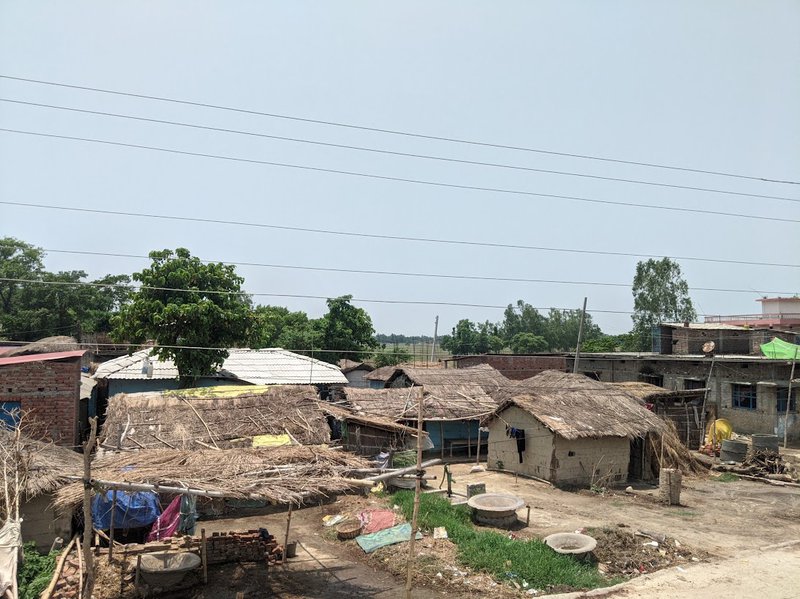
The initiation of the project by Friends of Change in Nepal, a local partner of Helvetas Nepal, and the subsequent programs enabled the strengthening of farmers' skills in riverbed farming, while also assisting them in adapting to the impacts of climate change through the adoption of climate change-adaptive technologies.
Change in Nepal has also distributing bamboo, trees and lemon grass to plant at the river banks to contain the damage of floods. Under the project, more than 2000 bamboos are planted in the banks of Bagmati and Lalbakiya River. Similarly, other trees also planted with lemon grass in the field.
"President Yadav mentioned that these biological interventions are designed to boost the natural ability of plants to withstand floods and the impacts of climate change. He further noted that as they develop, they will safeguard the earth's soil."
The project has carried out various initiatives, during which farmers have learned about resilient crop varieties and technologies to sustainably address climate change. To mitigate the impacts of flooding, the project has distributed lemon grass and bamboo to farmers at risk from Bagmati floods.
“During my tenure of two years as the Mayor of Rajdevi Municipality, I realized the significance of the Riverbed Farming techniques taught by the local partners of Helvetas Nepal to our farmers. Every year, the Bagmati river was eroding a significant portion of our fertile land. In response, we initiated some natural remedial measures, such as planting lemon grass and bamboo in collaboration with Friend of Change,” said Bhikhari Prasd Yadav, Mayor of Rajdevi Municipality.
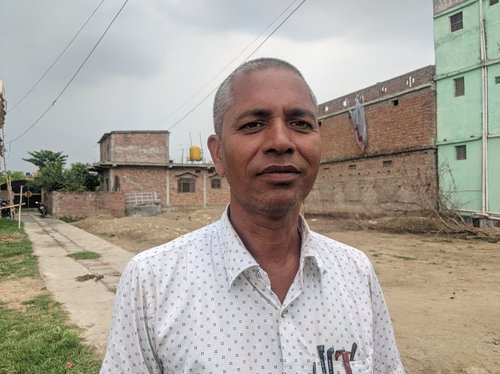
Yadav
With the technical assistance provided by the project, numerous impoverished and marginalized farmers have begun to generate income. Mayor Yadav further stated that due to the project, farmers have also been educated on utilizing underutilized resources from the riverbed and its banks of Bagmati and Lalbakiya rivers, in addition to enhancing their production skills on reclaimed soils.
The project has also assisted farmers by providing seeds, tree plant, fertilizers, and irrigation equipment, including the installation of deep bore wells and sprayer tanks. Das, a participant in learning adaptation technologies throughout sessions and field trials at field schools, mentioned that the lemon grass and bamboo plantations have remained unaffected by the floods. The bamboo has even helped in preventing soil erosion.
For Laddu Das and his team from Bhagbatimai Rural Municipality ward 1, introducing vegetable cultivation on river beds was a novel concept, and thus, he initially lacked confidence. However, following the capacity-building training sessions that bolstered his confidence, Das has now successfully grown vegetables such as cucumber, pumpkin, bottle gourd, and even achieved a bumper crop of watermelon. He is content with the outcome, having harvested and sold vegetables and watermelons worth Rs.500,000.00 from two bighas (3.4 acre) of land.
Ramshrestha Yadav, the head of Friends of Change Nepal, mentioned that the farmers have adopted bio-fertilizer Jholmol (Liquid fertilizer) as a novel approach beneficial in reducing production costs and enhancing crop yield and earnings. Yadav added that his organization has provided bamboo to farmers, who have expanded their cultivation to over 10 bighas of land to safeguard the rich soil. He reported that these bamboo plants have matured and are currently flourishing.
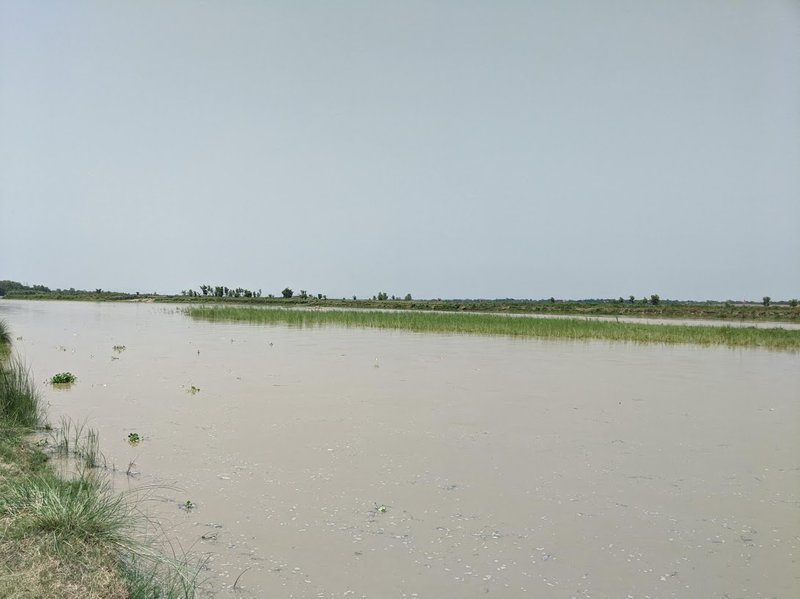
Bagmati River In Rautahat
Rampad Das from Bhagbatimai Rural Municipality ward 1 shared his experience, stating, "I'm venturing into vegetable cultivation on riverbeds for the first time with a small patch of land. However, the increased revenue from vegetable sales has boosted my confidence. I aim to cultivate vegetables on three Bighas of riverbed next year and would appreciate support from this initiative for vegetable seeds and fertilizers."
Similar to Das, individuals without land in Rautatha have significantly boosted their earnings by cultivating crops in the eroded soil of dried-up riverbeds. During the rainy season, the rivers Lal Bakiya and Bagmati overflow, inundating the surrounding agricultural lands.
Following the monsoon rains, a dry spell ensues, exposing the fertile soil of the riverbeds for four to five months. In Rautahat district, Helvetas Nepal, in collaboration with Friends of Change Nepal, a local NGO, has been instrumental in ensuring that the soil remains viable for farming during these months.
The dried-up riverbeds of the Bagmati and Lalbakiya Rivers have become hotspots for agriculture, primarily focusing on watermelons, pumpkins, cucumbers, and tomatoes. Over 967 households from 40 groups, predominantly belonging to impoverished, landless, or land-scarce communities, have seen significant improvements in their income levels through riverbed agriculture.
“This approach has been instrumental in achieving green growth adopted to the climate change, particularly in reducing the risk of poor and landless from climate change related disaster and food security,” said Hari Gurng, Team Leader Helvetas Nepal River Farming Project. “The project aims to end poverty and hunger, fostering economic development, and promoting gender equality.”

Dr. Prabin Manandhar, Country Director Helvetas-Nepal.
Through its efforts in Ratutahat, Helvetas Nepal, supported by the local NGO Friends of Change Nepal, leverages its extensive experience in creating employment opportunities.
“Riverbed farming is viewed as a viable solution to increase household incomes and improve food security for those who are landless or lack access to sufficient land in the Terai region of Nepal. Adjusting to shifts in weather patterns presents significant obstacles, especially for agriculture,” said Dr. Prabin Manandhar, Country Director Helvetas-Nepal.
The effectiveness of agriculture river banks of Bagmati and Lalbakiya rivers has demonstrated itself as a climate-resistant technique to reduce the impact of unfavorable weather conditions.

Keshab Poudel
Poudel is the editor of New Spotlight Magazine.
- FOURTH PROFESSOR Y.N. KHANAL LECTURE: Nepal-China Relations
- Jun 23, 2025
- Colonel JP CROSS: Centenary Birthday
- Jun 23, 2025
- REEEP-GREEN: Empowering Communities with MEP
- Jun 16, 2025
- BEEN: Retrofitted For Green
- May 28, 2025
- GGGI has been promoting green growth in Nepal for a decade: Dr. Malle Fofana
- May 21, 2025















